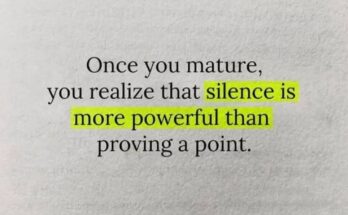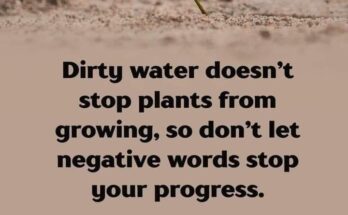
There’s a silent truth that echoes across all types of human relationships — romantic, familial, professional, or casual — and it’s this: disrespect cuts deeper than any wound and often leaves scars that time and apologies alone cannot heal. In a world where words are thrown carelessly and actions are often dictated by ego or impulse, many fail to recognize the weight of disrespect. They believe that once the dust settles, a simple “I’m sorry” will be enough to restore what was broken. But the reality is far more complex.
This essay unpacks a powerful and sobering idea: Disrespect can permanently shut doors that apologies cannot re-open. While forgiveness is divine, and people often strive to mend what’s been damaged, the bitter truth is that not all bridges can be rebuilt. Some moments, once lived, cannot be undone. Some words, once spoken, cannot be unheard. Some levels of disrespect, once shown, permanently change the landscape of a relationship — and no apology, no matter how sincere, can reverse that damage.
1. The Nature of Respect: The Foundation of Every Relationship
Respect is the silent thread that holds all human interactions together. It is the unspoken acknowledgment of another person’s dignity, value, boundaries, and presence. Without respect, love becomes toxic, friendship becomes conditional, and professional ties become hostile.
When someone respects you, they consider how their actions affect you. They speak to you with care, treat you with dignity, and honor your presence in their life. Disrespect, on the other hand, does the opposite — it dismisses your value, violates your boundaries, and makes you feel small, unseen, or replaceable.
When a person chooses to disrespect another, whether out of anger, pride, arrogance, or immaturity, they essentially tear at the very fabric of trust and security in that relationship.
Respect is the glue — and once it’s gone, everything starts to fall apart.
2. Apologies Are Not Erasers
We live in a culture where apologies are often used as magic wands — tools meant to fix any damage done with the assumption that “sorry” wipes the slate clean. But apologies are not erasers. They do not remove the memory of betrayal, the sting of harsh words, or the pain of humiliation.
A person can apologize a hundred times for calling you names, for yelling in anger, for belittling your dreams, or for treating you like you don’t matter — but that apology doesn’t undo the moment you realized they were capable of that kind of disregard.
Real apologies are necessary, yes. They are often the first step in healing. But they are not guarantees. They do not automatically earn a second chance. Because once someone has disrespected you, you may forgive them — but you will never forget how it felt.
3. Trust Is Fragile — And Disrespect Shatters It
Trust is a fragile thing. It’s not built overnight, and it doesn’t come from empty promises or charming words — it’s earned over time through consistent respect, care, and consideration. And while it takes years to build, it can be broken in seconds.
Disrespect doesn’t just hurt feelings — it breaks trust. When someone shows you disrespect, especially repeatedly or during your most vulnerable moments, it plants seeds of doubt. You begin to question their loyalty, their intentions, and their love.
Can I trust this person not to humiliate me again?
Can I count on them to treat me with kindness when I’m down?
Will they throw me under the bus the next time they’re angry or embarrassed?
Once that seed is planted, even if they apologize, the doubt remains. You might continue the relationship, but it will never be the same. Because something precious has been lost — your sense of safety with that person.
4. Some Doors Close for Good — And That’s Okay
Not every door is meant to stay open. There are moments in life when someone crosses a line so profoundly that the only response is closure. Not revenge. Not hate. Just finality.
And in those moments, even if they come back with remorse and apologies, the answer is still no. Because some disrespect is so egregious, so damaging to your soul, that allowing that person back in would mean disrespecting yourself.
This isn’t about holding grudges — it’s about holding standards. It’s about recognizing that while people are human and make mistakes, you don’t owe endless chances to someone who has consistently shown you who they are when it matters most.
Sometimes, protecting your peace means closing the door — locking it — and never looking back.
5. Apologies Without Change Are Manipulation
A genuine apology is more than just words. It is behavior. It is action. It is change.
Too often, people weaponize apologies. They say “I’m sorry” as a shortcut, not as a sign of true remorse. They expect forgiveness without doing the work to understand the pain they caused or how to ensure it never happens again.
But an apology without accountability or behavioral change is not healing — it’s manipulation. It’s a way of keeping access to you without respecting you. And over time, those false apologies become patterns, and those patterns become toxic cycles.
Eventually, you realize that your forgiveness has been taken for granted. That your kindness is being mistaken for weakness. And that’s when the door must close — for good.
6. Self-Respect Demands Boundaries
One of the most powerful things you can do in life is to choose yourself. Not in a selfish way — but in a self-respecting way.
When someone disrespects you and you walk away — you are not being dramatic, sensitive, or unforgiving. You are honoring yourself. You are teaching others how to treat you by showing what you will and will not accept.
You’re saying:
- I will not be gaslighted.
- I will not be disrespected and then expected to pretend it didn’t happen.
- I will not allow apologies to become excuses for repeated offenses.
- I will choose my peace, my worth, and my dignity — even if it means walking away from people I once loved.
Setting boundaries isn’t about punishment — it’s about protection. It’s a form of love you give yourself.
7. Real Love Doesn’t Disrespect You
Let’s get one thing straight: love is not disrespect. Ever.
Real love — whether romantic or platonic — doesn’t mock you, humiliate you, ignore your needs, or make you feel small. Real love doesn’t disrespect you and then expect you to be okay with it just because “they were stressed” or “they didn’t mean it.”
If someone truly loves you, they will strive to never hurt you intentionally. And if they mess up, they will go out of their way to earn your trust back — not just through words, but through consistent, humble actions.
So if someone disrespects you and then tries to guilt-trip you into forgiving them quickly, remind yourself: That’s not love — that’s control. And you don’t have to stay loyal to pain.
8. The Healing Power of Walking Away
One of the most healing decisions you can make in your life is to walk away from someone who disrespects you — no matter how much you love them.
It’s a radical act of self-care. It’s you choosing healing over history, growth over guilt, and peace over potential.
You don’t have to hate them. You don’t have to explain yourself. You simply have to know that you deserve better — and go find it.
Healing begins the moment you stop allowing people to harm you with their words, their silence, or their actions. It begins when you decide that the door is closed, not because you’re bitter — but because you’re better.
9. Forgive, But Never Forget the Lesson
Yes, forgive. Always forgive — for your own peace. Carrying resentment weighs you down. But don’t confuse forgiveness with re-entry. You can forgive someone and still keep the door shut. You can release the anger while keeping your distance.
Forgiveness is internal. It’s about letting go of the desire to retaliate or carry bitterness. But forgetting the lesson would be foolish.
If someone has shown you they’re willing to disrespect you once, they may do it again. If their apology was real, you’ll see it in their behavior. But if it was just damage control, you’ll see that too — and quicker this time.
Forgive them. Wish them well. But protect your peace by keeping certain doors closed.
Conclusion: Respect Is the Real Apology
At the end of the day, the truth is simple and sobering: Disrespect can permanently shut doors that no apology — no matter how heartfelt — can re-open. Some wounds change us. Some betrayals open our eyes. Some moments end chapters, and that’s okay.
Apologies are important, yes. But consistent respect is the real apology. And when someone shows you who they are — believe them.
You don’t owe anyone endless access to you. You don’t have to keep letting people in just because they say “sorry.” You are allowed to protect your peace, your heart, and your space — without guilt.
So when the door closes, let it. Not because you’re heartless, but because you’ve grown. Because you’ve learned. And because you finally understand: you deserve more than people who only recognize your worth after they’ve disrespected you.


